Mashaei: Filmmaker's Jailing Wrong; Regime Means It: No Valentine's Day!
19 Jan 2011 16:00Comments
Press Roundup provides selected excerpts of news and opinion pieces from the Iranian and international media. Click on the link to the story to read it in full. Tehran Bureau has not verified these stories and does not vouch for their accuracy. The inclusion of various opinions in no way implies their endorsement by Tehran Bureau. Please refer to the Media Guide to help put the stories in perspective. You can follow other news items through our Twitter feed.
THE LEAD
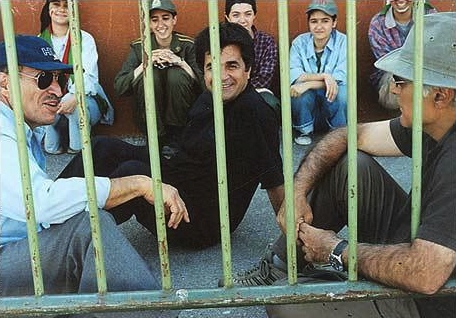
Iran Govt Opposes Film-maker Panahi's Sentence
AFP | Jan 19
Iran's government opposes a sentence served on renowned filmmaker Jafar Panahi which jails him for six years and bans him from making movies for 20 years, media said on Wednesday, quoting a top official.
"It is the judiciary which has passed the sentence and it is not the position of the government and the president," said Esfandiar Rahim Mashaie, President Mahmoud Ahmadinejad's chief of staff.
"We do not approve that Jafar Panahi cannot work for a long time based on this sentence," Rahim Mashaie was quoted as saying by Shargh newspaper.
Ahmadinejad Not in Favour of Jail for Filmmaker
DPA (via Sify) | Jan 19
Panahi's lawyer, Farideh Gheyrat, has already filed an appeal and hopes to convince a higher court to overturn what she called a 'very hefty verdict' imposed by a tribunal mainly in charge of national security offences.
Panahi and other Iranian filmmakers supported the opposition Green Movement, led by Mir-Hossein Moussavi, before and after the June 2009 presidential election which gave Ahmadinejad a second term.
Panahi accused the government of electoral fraud and refused to acknowledge the president's re-election.
Iranian filmmakers have claimed that since Ahmadinejad became president in 2005, greater restrictions have been imposed on artists, especially filmmakers.
See also: "The Fate of Iran's Great Filmmakers" (Tehran Bureau)
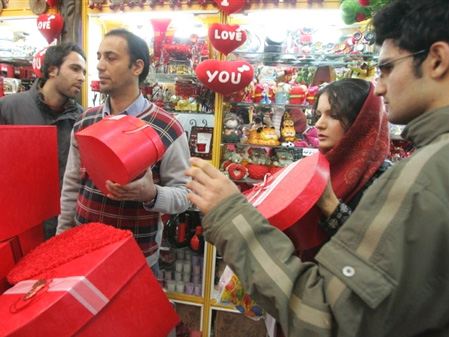
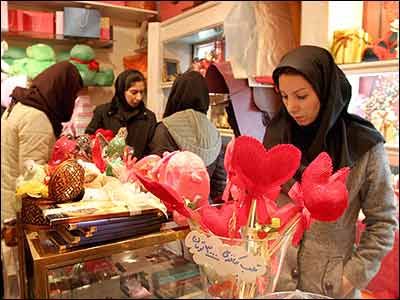
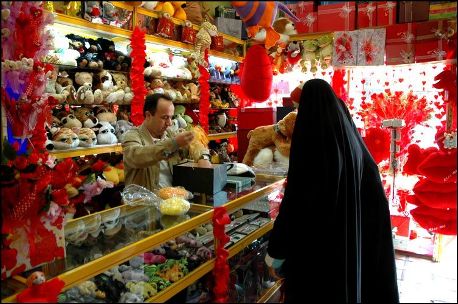
Iran Bans Production of Valentine's Day Gifts
Reuters | Jan 18
Iran has banned the production of Valentine's Day gifts and any promotion of the day celebrating romantic love to combat what it sees as a spread of Western culture, Iranian media reported.
The Feb. 14 celebration named after a Christian saint is not officially banned but hardliners have repeatedly warned about the corruptive spread of Western values. Under Iran's Islamic law, unmarried couples are not allowed to mingle.
The printing works owners' union issued an instruction on the ban, imposed by Iranian authorities, covering gifts such as cards, boxes with the symbols of hearts and red roses.
"Honouring foreign celebrations is the spread of Western culture," said the union's head, Ali Nikou Sokhan, ILNA news agency reported. "Our country has an ancient civilisation and various days to honour kindness, love and affection."
OTHER NEWS
Iranians Say Goodbye to 10 Cent Gasoline
Reuters | Jan 18
Iranians will no longer be able to buy bargain gasoline from Friday as President Mahmoud Ahmadinejad tries to bolster the sanctions-hit economy by phasing out subsidies on basics such as energy, food and water.
The semi-official Mehr news agency said on Tuesday that the ration of gasoline costing just 1,000 rials per liter (about 10 U.S. cents, or $0.38 per U.S. gallon) would be zero from the next Iranian month, which starts on January 21.
Mohammad Rouyanian, head of Iran's Transportation and Fuel Management Office, said motorists would still qualify for 60 liters of "semi-subsidized" gasoline, at 4,000 rials, after which they would have to pay 7,000 rials, about $0.70 a liter.
Consumption has fallen to between 52 and 53 million liters per day from around 61 million before the subsidy cuts, Oil Minister Massoud Mirkazemi said on Sunday, announcing that Iran hoped to boost its refining capacity to become self-sufficient in gasoline later this year.
WikiLeaks: US Advised to Sabotage Iran Nuclear Sites by German Thinktank
Guardian | Jan 18
The United States was advised to adopt a policy of "covert sabotage" of Iran's clandestine nuclear facilities, including computer hacking and "unexplained explosions", by an influential German thinktank, a leaked US embassy cable reveals.
Volker Perthes, director of Germany's government-funded Institute for Security and International Affairs, told US officials in Berlin that undercover operations would be "more effective than a military strike" in curtailing Iran's nuclear ambitions.
A diplomatic cable sent by the US ambassador to Germany, Philip Murphy, in January 2010, records that Perthes said a policy of "covert sabotage (unexplained explosions, accidents, computer hacking etc) would be more effective than a military strike, whose effects in the region could be devastating".
Perthes is a leading western expert on Iran. An earlier diplomatic cable, sent by Murphy on 14 December 2009 showed that his advice was heeded by politicians and officials -- including Condoleezza Rice, the former US secretary of state.
UN Team Examines Seized Iranian Weapons in Nigeria
AP (via Tabnak) | Jan 18
A team of U.N. weapons experts and observers examined a seized Iranian weapons shipment found at Nigeria's biggest port, authorities said Tuesday, a step toward possible new international sanctions against Iran.
The nine-member panel first met in Abuja, Nigeria's capital, before traveling to Lagos to see the shipment still being held at Lagos' busy Apapa Port, said Nigerian Foreign Minister Odein Ajumogobia. The minister said the panel, led by Georgia's former foreign minister Salome Zourabichvili, would offer a report to the world body about the shipment.
"The presence of the U.N. panel...is to highlight the danger international communities face in keeping the world reasonably safe," Ajumogobia said in a statement released to journalists.
Inside 13 cargo containers marked as building materials, inspectors in October found 107 mm artillery rockets, rifle rounds and other arms. Those rockets can accurately hit targets more than 5 miles (8.5 kilometers) away with a 40-foot (12-meter) killing radius. Insurgents in Afghanistan and Iraq have used similar rockets against U.S. troops. China, the United States, and Russia manufacture versions of the rocket, as does Iran.
Nigeria Trial to Expose Iran Gunrunning
UPI | Jan 18
A trial in Nigeria at the end of the month is expected to expose details of an Iranian arms smuggling operation in Africa run by the Revolutionary Guards' clandestine arm, the al-Quds Force.
An Iranian, Azim Aghajani, identified by Nigerian authorities as a senior officer in the al-Quds Force, faces charges of smuggling 13 shipping containers loaded with weapons and ammunition that were uncovered Oct. 26 at the port of Lagos.
He was charged Nov. 25 along with three Nigerians for importing and attempting to export arms.
A second Iranian sought by the Nigerians, Ali Akbar Tabatabaei, listed as the commander of al-Quds Force operations in Africa, claimed diplomatic immunity when the arms were discovered.
Iranian Embassy Dismisses Reports on Halting Fuel Shipments to Afghanistan
Fars | Jan 18
The Iranian embassy in Kabul in a statement denied reports that Iran has stopped fuel shipments to Afghanistan, and announced that Tehran has exported 71,501 tons of fuel to its Eastern neighbor in just less than a month.
"Iran sent 17,546 oil tankers weighing 399,764 tons from March 22 to December 21 and 929 oil tankers weighing 71,501 tons from December 22 to January 15 to Afghanistan after the return of Afghan First Vice-President Marshal (Qasim) Fahim from his visit to Tehran," the statement said on Tuesday.
The Iranian embassy also reiterated that a large number of 160 Iranian oil tankers are waiting at Milak-Dougharoun border to enter Afghanistan due to a delay by the Afghan Trade and Industries Ministry in announcing the level of the country's needed fuel.
The statement underlined that in case the Afghan government voiced its agreement, transit of Iranian fuel to the country would continue based on mutual agreements in future.
Iran supplies about 30 percent of Afghanistan's refined fuel, Afghan officials say.
Iran Says It Will End Afghan Fuel Blockade
AP | Jan 18
Iran told the Afghan government on Tuesday that it will stop blocking thousands of tanker trucks trying to move fuel into Afghanistan, authorities announced.
An Afghan government statement said the Iranian ambassador to Afghanistan, Fada Hussain Maliki, told President Hamid Karzai that the fuel tankers still stuck at the border would be allowed to enter Afghanistan during the next four days.
The Iranians began barring fuel trucks from crossing the Iran-Afghanistan border in late December, leaving about 2,500 trucks stuck at three crossings. The move, which Afghan officials have criticized as being tantamount to an embargo, has led fuel prices to rise as much as 70 percent.
Tehran has said the ban was linked to its recent decision to slash domestic fuel subsidies in a bid to cut costs and boost an economy squeezed by international sanctions. Afghan officials said Iran also had expressed concern that fuel shipments were supplying NATO forces in Afghanistan.
"This fuel doesn't belong to NATO, it belongs to the poor Afghan people," said Farid Shirzai, head of the Afghan Commerce Ministry's fuel department.
Afghan Traders Halt Deals with Iran over Fuel Ban
Reuters | Jan 18
Afghanistan's trade associations say they have halted trade with neighboring Iran to protest against an unexplained fuel blockade which has been choking the Afghan economy, the groups' leaders said on Tuesday.
The President of the Afghan Chamber of Commerce, Qurban Haqjo, said thousands of independent traders have agreed to halt trade with Iran to protest the problems caused by the ban.
If fully implemented the pact could suspend deals worth millions of dollars, and possibly damage the weak Afghan economy.
"It is an independent decision by Afghan traders, and the ban starts from today," Haqjo told a news conference in Kabul.
"This could badly hurt both Iran and Afghanistan but we had no other choice," Haqjo said. Also at the gathering were the heads of 21 traders' associations, representing importers and exporters of everything from dried fruit to gemstones.
Interior Minister: Iran Paid Much for Afghans over Past 30 Years
Tabnak | Jan 18
Interior Minister Mostafa Mohammad Najjar said on Tuesday that Iran has paid a heavy cost over past 30 years for supporting the Afghan refugees in Iran.
Mohammad Najjar made the remark to reporters after a meeting with the UN envoy to Afghanistan Stefan di Mistura.
"A total of 276,000 Afghan students are currently studying in Iran. Some 17,000 Afghan nationals have been graduated from the Iranian universities," he added.
Mohammad Najjar noted that there are currently more than three million Afghan refugees living in Iran.
Iran Urges Islamic Parliaments to Back Tunisians
Mehr | Jan 18
Majlis Speaker Ali Larijani has called on the parliaments of the Islamic countries to stand by the Tunisian nation in their struggle against dictatorship.
Larijani made the remarks on Tuesday in response to the recent developments in the African country of Tunisia in which its president fled to Saudi Arabia.
"Ignoring the Tunisians' calls will not solve anything and the Islamic world should hear Tunisian people's shouts," he said.
Hong Kong to Pass Laws to Seize Iran-Linked Assets
AFP | Jan 19
Hong Kong said Wednesday it was "striving" to pass legislation to comply with UN sanctions against Iran, after 20 shipping firms in the city were accused of being linked to Tehran's weapons buildup.
Last week, the US Treasury Department slapped sanctions on 24 shipping companies, including four in Britain's Isle of Man, accused of being fronts for Iranian businesses involved in Iran's missile programmes.
The firms are allegedly affiliated with the Islamic Republic of Iran Shipping Lines (IRISL), which has been slapped with international sanctions.
Hong Kong, a semi-autonomous Chinese territory, is awaiting Beijing's final approval to usher in the changes, but China has said it would support the sanctions passed by the UN Security Council in June last year.
Nuclear Invitation Encouraging
Iran Daily | Jan 18
Head of the International Atomic Energy Agency (IAEA) Yukiya Amano termed Iran's invitation for visiting its nuclear facilities as an encouraging sign.
Amano, who is currently in India, made the remark while commenting on Iran's invitation to a number of countries to inspect its nuclear facilities, IRNA reported.
"I have no particular comment but it is an encouraging sign. I hope to hear some positive outcome from their dialogue," the IAEA chief said.
Representatives from the IAEA, the Non-Aligned Movement troika, Group of 77, the Arab League and Syria, Venezuela and Oman Sunday wrapped up a two-day tour of the key facilities, including the Arak heavy water reactor and Natanz enrichment facility in central Iran.
Oddly Enough
Mehr (via Tabnak) | Jan 18
Majlis representative Elias Naderan has summoned minister of science, Kamran Daneshjou, to the Majlis to probe the educational background of first vice-president Mohammad Reza Rahimi. Daneshjou has said that he has no information about Rahimi's educational level because he has not submitted any educational certificate to the government.
Naderan has asked whether Rahimi is a university graduate, post graduate or has a PhD. The minister has said that he has no information in this regard but he has promised to probe Rahimi's educational background and inform the Majlis of his finding within the next two weeks.
Naderan has posed the same question to the previous science minister, Mohammad Mehdi Zahedi about the educational certificate of the late Ali Kordan and had been told that no document exists on his educational background in the ministry.
OPINION & ANALYSIS
Iran Snapshot: Politics, Propaganda, and Denial Special
Scott Lucas (Ayandenews.com via Enduring America) | Jan 19
[F]or the in-depth observer of Iranian politics, there is today's contest over the image of key Ahmadinejad aide Esfandiar Rahim-Mashai. His outlets are featuring this image:
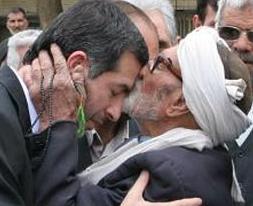
For the opponents of Rahim-Mashai within the Iranian establishment, this is a signal that he intends to run for the Presidency in 2013. That is because the photo, they claim, is a deliberate reminder of "Shahid Rajai" (Martyr Rajai). Pictured on the left below is Mohammad Ali Rajai, the Iranian President who was killed in 1981 by a bomb.
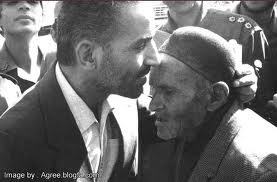
Iran: Darkness, Camera, Inaction
Richard Poplak (Daily Maverick) | Jan 19
If south Tehran's Café Entaracte has a signature feature, it must be the opaque window abutting the counter, canted slightly, looking out on a vista of dreams. Sometimes, what lies beyond the window is tenebrous - an enormous cavern, a slit of light like a gash across a massive white screen. On other occasions, the window reveals any number of scenes rendered in harsh primary colours -- the hurly-burly world of popular Iranian trash cinema. Standing at the window, the viewer is a voyeur, a probing oneiricist. The sensation is, like so much Iranian art cinema, a self-reflexive, self-conscious endeavour; one experiences the uncomfortable, invasive act of watching.
Light reflected from the screen illuminates rows of empty seats -- indeed the few remaining cinemas dotted across Iran are all but deserted. Nonetheless, the window reveals a fresh perspective on the power of cinema -- a recusal to those who have judged film unworthy. The sensation is both claustrophobic and deliriously liberating -- akin to a scene from Fellini's "8 ½": man stuck in traffic, trapped in a car, trying to kick through the windshield, sound muted except for his own breathing. This window, a screen on to a screen, is the most poignant monument to cinema I have ever encountered.
To find the window, the visitor must first negotiate the crowds on Jamhouri Ismaeli Street, walk from the lobby of the Cinema Jamhouri and up a staircase lined with poster art of American films set in light boxes: prestidigitation whodunit "The Illusionist", horror sequel "Grudge 2", straight-to-DVD actioneer "Edison". (These have not been chosen for the films they represent, but rather because they represent film: for some reason, the ever-capricious ministry of culture has okayed them for public display). At the head of the stairwell, one encounters a scene that's rare in Tehran, a city of 14 million souls with precious little public space. People smoke on couches, others sit on a bricolage of old furniture sipping hot drinks, Persian rugs thrown over a Formica floor, muted but distinct Western music (in this case, Sade, "Hang On To Your Love"), several potted plants, a bookshelf lined with periodicals, a long counter with jars of cookies and an espresso machine.
Murdering Scientists
In one of his regular Reflections dated 6 January 2011, the Cuban leader, Fidel Castro, explores the possibility that the recent assassinations of Iranian scientists could have been carried out by Israel's secret service, the Mossad, with the connivance of American and British intelligence.
At the end of November 2010, nuclear scientist, Majid Shariari, lost his life in an explosion just outside his home. In January 2010, Dr. Masoud Ali Mohamadi, a nuclear physicist at Tehran University, was also killed in a bomb blast as he was leaving home for work. Dr. Arseshir Hosseinpour was found dead at the nuclear centre in Isfahan in 2007.
Castro attributes to Gordon Thomas, a British expert on the Mossad, the view that "all Israeli assassination attempts in the last few years against personalities associated with the Iranian nuclear project have been committed by the Kidon (bayonet) unit. According to the Jewish newspaper Yediot Ahronot this unit is made up of 38 agents. Five of them are women. They are all between 20 and 30 years old and they speak several languages -- including Persian -- and they are able to come and go from Iran with ease. They are based in the Negev Desert."
The assassination of Iranian scientists mirrors the killing of a much larger number of Iraqi scientists allegedly also by Mossad agents between 2003 and 2006. It is estimated that something like 550 scientists and other academics were killed during that period.
posted january 19, 2011
FRONTLINE is a registered trademark of wgbh educational foundation.
web site copyright © 2008-2014 TehranBureau










In order to foster a civil and literate discussion that respects all participants, FRONTLINE has the following guidelines for commentary. By submitting comments here, you are consenting to these rules:
Readers' comments that include profanity, obscenity, personal attacks, harassment, or are defamatory, sexist, racist, violate a third party's right to privacy, or are otherwise inappropriate, will be removed. Entries that are unsigned or are "signed" by someone other than the actual author will be removed. We reserve the right to not post comments that are more than 400 words. We will take steps to block users who repeatedly violate our commenting rules, terms of use, or privacy policies. You are fully responsible for your comments.